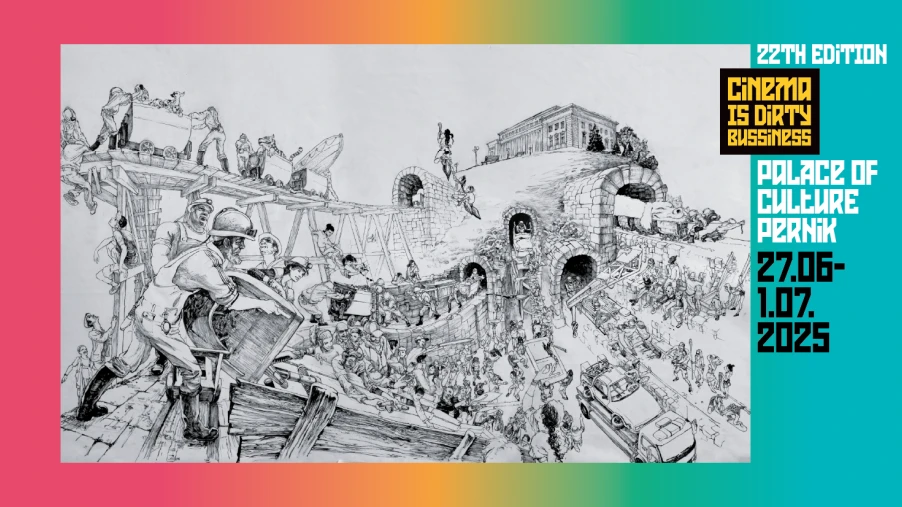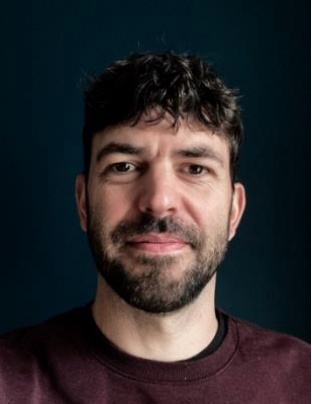SELECTED PROJECTS FOR THE FILMER FORGE PITCH PROGRAM

SELECTED PROJECTS FOR THE FILMER FORGE PITCH PROGRAM
We are delighted to announce the 13 selected projects for this year's FILMER FORGE PITCH program, held in partnership with EAVE Producers and MIDPOINT Institute. Trainers and mentors from EAVE will work directly with the selected participants, providing high-level professional guidance throughout the program. Thanks to our collaboration with MIDPOINT, one of the pitched projects will receive a guaranteed spot on MIDPOINT Institute’s official shortlist, along with a complimentary Online Feedback Session with experienced MIDPOINT tutors. Additionally, IN THE PALACE will allocate a fund of 16,000 BGN to support the most outstanding projects.

1. Wear Me! directed by Ilina Perianova
“Wear Me! is a short musical following Maya, a 13-year-old Roma girl who dreams of emulating her favorite influencer but faces the realities of poverty, social injustice, and the fashion industry's hypocrisy. This film is part of a short musical trilogy ( Eat me! -2016) addressing environmental issues, focusing here on the fashion industry, the second most polluting globally. The story highlights the struggles of the Roma community in Bulgaria, linking social inequality with environmental damage. The soundtrack is inspired by Roma traditions, adding authenticity to Maya's journey.
Developed through research on clothing overconsumption, the film shows the impact of fast fashion and social media. It uniquely portrays clothes as characters, with Maya initially seeing only clothes, not faces, symbolizing identity and social media's toxic influence."

2. The Artist Who Painted Light directed by Delyan Mihaylov
"Drawn by a lifelong fascination with the sea, cliffs, and the multifaceted symbolism of lighthouses, I conceived “The Artist Who Painted Light” as an ode to both their beauty and their broken promise. At its core, the film explores the artist’s eternal struggle against despair: a battle with fate, faith, and the purpose we carve from our own limitations. I identify with the keeper’s solitude, wielding only brushes and paint to challenge a dark world that seems rigged against him. Inspired by the painter’s grief and the haunting realism of “Poor Things”, I aim to render each frame as if it were alive - an oil painting in motion.
I want to invite the audience to wrestle with questions of fate and why we fight at all, leaving the final interpretations to be theirs alone. The story’s spiral into madness will be mirrored by its visual rhythm: camera movements growing manic, lighting shifts intensifying, then snapping into stillness for reflection at the end, after the big reveal.
“The Artist Who Painted Light” is a surreal descent into the inescapable loops of grief and creation. An existential fable where art and despair become one."

3. Novo selo directed by Irena Daskalova
"What’s happening in Ukraine, and the constant eruption of military conflicts around the world, make me think every day about what happens after the wars. How will ordinary people continue their lives? Will they survive physically and emotionally? I feel the need to scream through my story that the consequences of war are no less devastating than the war itself.
I have read and studied many stories related to the events and life after war - in Europe, in Asia, everywhere. There are thousands of stories of people who were killed by mistake because they were considered enemies. There are people whose families end up in foreign countries after new borders are drawn. There are people who do not know how to continue on their own and are on the streets. There are people whose children die because there is no doctor to examine them. And behind all this chaos there is one reason - war.
„Novo selo"(“New Village") does not deal with such dramatic facts of everyday life, but looks into the souls of all these people."

4. Moneywise directed by Lyubo Yonchev
"This film explores a bizarre true story that blurs the line between comedy and tragedy. Through the absurd theft of Charlie Chaplin’s coffin, I dive into themes of greed, failure, and human fragility. Gancho and Roman are not just criminals—they’re reflections of our flawed desires and delusions. Their botched plan is both ridiculous and deeply human, filled with fear, humor, and desperation. At its core, the film asks: what does it mean to laugh in the face of despair? Oona Chaplin’s calm defiance contrasts their chaos, turning blackmail into farce. I aim to create a darkly comic world where sympathy and satire coexist. The goal is for the audience to laugh, then pause - caught between absurdity and truth."

5. Lucia at the Window directed by Julian Lona and Agustin Balbi Gotusso
"The project was born from spending many nights in a typical Madrid bar, always seeing Conchita, a neighbor on the first floor of the building across from the outside tables. She always sits by the window, with a sour face, doggedly monitoring the activity in the establishment. We asked about her and received a wide variety of answers; from that she loves feeling connected to the bar and its noisy clientele, to that she hates the place and everyone who passes by. From our fascination, "Lucía at the Window" was born. We aim to use psychological horror to address current issues of interest to us, such as gentrification, migrant labor exploitation, and emotional vampirization in geriatric care. Through the relationship between Lucía and Esteban, we explore the dynamics of power and manipulation inherent in a context of inequality. Meanwhile, the tension between the protagonists and the bar — along with its owner — reflects the helplessness of local residents in the face of what seems to be the irreversible advance of commercial interests in their communities."
6. Invisible directed by Marko Crnogorski
"This film explores the silent struggle of women in rural North Macedonia, where over half remain economically dependent on men. After her husband's death, Jovana faces poverty, isolation, and overwhelming responsibility. With no other option, she disguises herself as a man to find factory work. Her internal journey—marked by grief, fear, and resilience—unfolds subtly through daily struggles. Dialogue is minimal; her emotions are expressed through silence, gesture, and gaze. The narrative captures a woman’s quiet resistance within a patriarchal system. Supporting characters reflect systemic failure rather than personal malice. Jovana becomes a symbol of survival and hidden strength. Her transformation questions the meaning of empowerment in unequal societies. This is a story of endurance, not triumph."

7. In the Margins directed by Esin Özalp Öztürk
"As a woman director who has worked in both historical and experimental documentary, I feel deeply connected to stories of erasure. This film is an emotional response to how women have been excluded from recorded history—especially in patriarchal societies. I chose animation to create a textured visual resistance against invisibility, using gold leaf, shadow play, and stylized brushwork to emphasize both presence and absence. The protagonist does not speak, but her act of painting becomes a bold voice."

8. Hot Pizza Delivery directed by Danilo Stanimirović
"I was born at the very end of last century and for many generations including mine, sexual education did not exist. Everything you wanted to know about sex you were learning from PornHub. After you lie about your age by clicking the button on screen, the majority of content that appears is full of violence. Most of the underaged users get confused thinking that violence is the way you should do it."
9. Happy Birthday, Kızım directed by Can Deniz Atici
"On her 32nd birthday, Leyla, a Turkish immigrant and food delivery driver in Toronto, goes about her day quietly, trying to ignore birthday messages and calls from home. Her only real companion is Lokum, a dog who waits patiently in the front seat as Leyla juggles delivery orders and rehearses English phrases with an audio tutor between stops."

10. Blue Days directed by Lina Pavlova
"Blue Days is a deeply personal story inspired by my own childhood experience—when my mother left me in my grandmother’s care in Montana while she worked in Sofia. She survived domestic violence and a painful divorce, yet found the strength to provide for us, traveling every weekend to be with me. Though she never showed her pain, I sensed something was wrong. Through this film, I want to honor her courage and the resilience of ordinary women who face fear and hardship but choose hope for their families. The film is a poetic and meditative impression of a young mother’s inner world, revealed through quiet gestures and moments. It also explores how a child perceives this fragile, complicated family bond. Blue Days is my tribute to the silent strength, sacrifice, and love that hold families together."

11. Where Have You Been That Night? directed by Margarita Ruseva
"As the director of Where Have You Been That Night?, my motivation is to highlight the emotional disconnection that defines our modern world. Despite living in an era of unprecedented connectivity, we’ve become more isolated, wrapped up in our own lives and indifferent to those around us. This film is a wake-up call to my generation, urging us to rediscover empathy and the importance of looking out for each other. I want to inspire viewers to break through their self-centered worlds and remember that our true strength lies in our shared humanity."
12. Mister Y directed by Milutin Filipovic
"As a filmmaker, I feel a persistent and burning desire to tell stories that emotionally haunt me—both in dreams and in waking life. Emotionally driven storytelling is closely tied to the philosophical side of my personality, which seeks to dismantle stereotypes and constantly push boundaries, avoiding clichés and leading toward the unconventional. Without this side, any artist loses originality. While I’ve followed technological progress from a young age and wholeheartedly support it, I’m aware that, in the hands of malicious intent, this same progress can also reveal its darker side. It has been scientifically proven that our unconscious minds communicate with others via telepathic vibrations beyond the reach of our conscious brains. Metaphorically, the world of sperm cells and the fertile ground of dreams allowed me to bring characters together with their true intentions, stripped of the protective masks worn in our sensory world. After all, technology is just a weapon in human hands."

13. Exit Frances directed by Edwin Hasler & Mayla Valdes Santos
"At the moment the first draft focuses on the sister Zoe observing Frances and doesn’t grab on the themes clearly enough. The second draft, which I’m working on, will be more focused within the experience of Frances. I want the dialogue of the other characters to happen around Frances, about her, not to her. So we get a sense of her withdrawal and dig right in to the personal detail of her intimate curiosity. This is a story about curiosity pushed too far, but also a coming-of-age story about the essential childhood lessons learned by experimenting with experiences outside of the security of family, the inherent dangers of that moment, and the inevitability and importance for a developing personality to let go of innocence and develop a grit and maturity ready to integrate with the community. This is a story about women. There are men in it, but they are incidental, they don’t participate in conversation, they make no decisions, and they do not directly affect the story."





